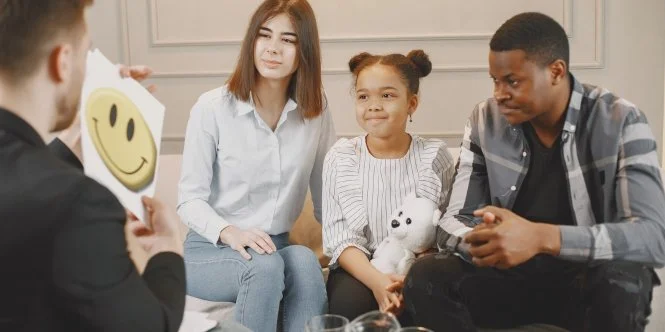How Teen Counseling Helps with Social Anxiety and Making Friends
For many teens, making friends isn’t as easy as just saying hello. Social anxiety can create overwhelming fear in everyday situations, like speaking up in class, joining a group, or starting a conversation. Over time, it can lead to isolation, loneliness, and low self-esteem. You want to connect, but fear and self-doubt keep getting in the way.
Anxiety disorders affect nearly 31.9% of teens ages 13 to 18. Research shows that without treatment, these teens are more likely to struggle in school, miss out on social experiences, and face a higher risk of substance use.
In this blog, we’ll look at how teen counseling can help with social anxiety and give young people what they need to make real, lasting connections with others.
What Social Anxiety Feels Like for Teens
Social anxiety can make even basic interactions feel like high-stakes performances. Teens with social anxiety might replay conversations in their heads, worrying they said the wrong thing. It’s a deeper fear that kicks in during social situations, especially when a teen feels like they’re being watched or judged. It might look like avoiding eye contact, skipping class presentations, or staying quiet even when they have something to say. When these patterns start affecting daily life, they can become clear signs a teen needs counseling to help them cope and rebuild confidence.
This kind of anxiety can affect friendships, school performance, and confidence. Anxiety is common during adolescence, but that doesn’t mean a teen has to struggle through it alone.
How Teen Counseling Can Help
Teen counseling helps take that fear apart, one layer at a time. Licensed professional counselors don’t just tell teens to "get over it" or "be more confident." They listen, help teens see what’s driving their anxiety, and offer real ways to handle it.
1. Using CBT to Change Negative Thinking
Cognitive Behavioral Therapy (CBT) is one of the most effective approaches used in teen counseling. It helps teens look at the connection between their thoughts, emotions, and actions. Many teens with social anxiety have an inner voice that tells them, "I’ll say something dumb," or "Everyone will laugh at me."
A therapist can help them spot those thoughts and figure out where they come from. From there, they work together to challenge and replace them with more realistic, encouraging ones. Instead of "They’ll think I’m weird," it becomes "I might feel nervous, but that doesn’t mean I’ll mess up."
2. Exposure Therapy: Facing Social Fears Gradually
Exposure therapy is often used alongside CBT. It involves helping teens face their fears a little at a time, in a way that feels safe and manageable.
Let’s say a teen is afraid to order food at a restaurant. The therapist might suggest they start by practicing what to say. Then maybe they try ordering with a parent nearby. Eventually, they build up the courage to do it on their own. Bit by bit, confidence grows.
Exposure therapy doesn’t push teens into situations before they’re ready. It gives them small wins to build on.
3. Practicing Social Skills in a Safe Space
Some teens aren’t sure what to say or how to act in social situations. Counseling for teens creates a space where they can learn and practice without fear of being judged.
They might work on things like making eye contact, starting conversations, or even just learning how to show interest in someone else’s story. These aren’t "perfect" skills they need to memorize. It’s about helping teens feel more natural and comfortable being themselves around others.
Therapists often use role-playing or real-life scenarios so teens can try out these skills and feel more prepared.
4. Building Confidence and Self-Esteem
Anxiety feeds on self-doubt. Many teens feel like they’re not good enough or that others will automatically dislike them. Counseling helps challenge those beliefs.
Over time, teens learn that they can survive awkward moments, make mistakes, and still be okay. They begin to recognize their strengths and see their worth beyond what others might think. Confidence doesn’t come all at once, but counseling helps plant the seeds.
5. Family support
Counselors often incorporate parents or caregivers into sessions when it’s helpful. Improving communication and strengthening relationships between teens and their families can make a huge difference. When everyone is working together, progress feels more supported and lasting.
Help Your Teen Break Through Social Anxiety
At Know Your Worth Counseling, we believe every teen deserves the chance to build confidence and form real friendships without anxiety getting in the way. Our teen counseling services provide a supportive space where young people can learn to manage fear, improve communication, and connect more easily with others.
If your teen is struggling to make friends or avoids social situations, this could be the support they need. Book a teen counseling session today and give them tools that last a lifetime.
Final Thoughts
Social anxiety can feel like a wall between teens and the life they want. Teen counseling helps break that wall down. With support, practice, and patience, teens can learn to manage anxiety, speak up, and build friendships that feel good. They deserve that kind of connection. And it’s possible.
FAQs
How do I know if my teen needs counseling for social anxiety?
If your teen avoids social situations, gets anxious around peers, or isolates themselves often, counseling could help.
Will counseling force my teen to talk about things they’re not ready to share?
No. Good therapists move at your teen’s pace. Trust and safety come first.
Can social anxiety really get better with counseling?
Yes. CBT and other therapy approaches have helped thousands of teens reduce anxiety and build confidence.
How long does it take to see progress?
Some teens notice changes within weeks. Others take longer. Progress isn’t rushed.
Can I be involved in the counseling process?
Definitely. At Know Your Worth Conseling, we welcome parent check-ins or provide updates and guidance.




